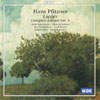Pfitzner Complete Lieder, Volume 5
Excellent singing and playing in this moving collection of late Pfitzner [song] songs
View record and artist detailsRecord and Artist Details
Composer or Director: Hans (Erich) Pfitzner
Label: CPO
Magazine Review Date: 5/2000
Media Format: CD or Download
Media Runtime: 74
Mastering:
DDD
Catalogue Number: CPO999 491-2

Tracks:
| Composition | Artist Credit |
|---|---|
| (4) Lieder |
Hans (Erich) Pfitzner, Composer
Axel Bauni, Piano Hans (Erich) Pfitzner, Composer Iris Vermillion, Mezzo soprano |
| (8) Lieder (Alte Weisen) |
Hans (Erich) Pfitzner, Composer
Donald Sulzen, Piano Hans (Erich) Pfitzner, Composer Julie Kaufmann, Soprano |
| (6) Liebeslieder |
Hans (Erich) Pfitzner, Composer
Donald Sulzen, Piano Hans (Erich) Pfitzner, Composer Julie Kaufmann, Soprano |
| (6) Lieder |
Hans (Erich) Pfitzner, Composer
Axel Bauni, Piano Hans (Erich) Pfitzner, Composer Iris Vermillion, Mezzo soprano |
| (3) Sonnets |
Hans (Erich) Pfitzner, Composer
Hans (Erich) Pfitzner, Composer Robert Holl, Bass Rudolf Jansen, Piano |
Author: Michael Oliver
Alas, Pfitzner stopped writing songs in 1931, so this is the last volume in CPO's absorbing survey. But he could hardly have ended better, nor with more of a sense of farewell. Op 41 No 3, a setting of an Eichendorff sonnet about the long-awaited serenity of old age, ends with the arrival of an unexpected messenger, knocking cheerfully at the window. 'Astonished, you step out and do not return. Then at last comes the spring that never ends. 'The messenger is death? Perhaps, but at this point a melody hinted at earlier finally flowers in calm D major. It is an extremely beautiful leave-taking, and Robert Holl sings it with deep but restrained feeling; but we have heard that melody before, in the fifth song of Op 40, a setting of Goethe's Wanderers Nachtlied I written only a week or so earlier. For such a short text (eight brief lines) it is a very big song, solemnly grave, and it is difficult to say what is more moving, the song itself or Iris Vermillion's passionate conviction that it is a masterpiece.
Holl is very fine throughout, perhaps acting a little too intensely in Dehmel's The working man, who has all that he wants from life save the time to enjoy it (Op 30), but in the bright vision experienced in the oppressive darkness ofHuss's Dungeon (Op 32 - the vision is, again, of 'endless spring') and the dark grief of To dawn (Op 41) he is outstanding. Vermillion, however, is even finer, her firm mezzo capable both of quiet intimacy (a touchingly simple setting in Op 30 of Morike's Denk es, o Seele) and the bold, grand gestures of Eichendorff's The call to awake (Op 40).
The often epigrammatic Keller settings of Op 33 call for a lighter voice; so do the love songs, Op 35. I found Julie Kaufmann a little too bright in earlier volumes, but she is alert to the quirkiness as well as the high lyrical lines of the Keller settings, and in the last song of Op 35, a stormily vehement vision of love destroying like fire, she takes brave risks. As before, nothing but praise for the three pianists (Pfitzner often makes virtuoso demands) and the sensitive recording balance, and nothing but gratitude for the series as a whole.'
Holl is very fine throughout, perhaps acting a little too intensely in Dehmel's The working man, who has all that he wants from life save the time to enjoy it (Op 30), but in the bright vision experienced in the oppressive darkness of
The often epigrammatic Keller settings of Op 33 call for a lighter voice; so do the love songs, Op 35. I found Julie Kaufmann a little too bright in earlier volumes, but she is alert to the quirkiness as well as the high lyrical lines of the Keller settings, and in the last song of Op 35, a stormily vehement vision of love destroying like fire, she takes brave risks. As before, nothing but praise for the three pianists (Pfitzner often makes virtuoso demands) and the sensitive recording balance, and nothing but gratitude for the series as a whole.'
Explore the world’s largest classical music catalogue on Apple Music Classical.
Included with an Apple Music subscription. Download now.

Gramophone Digital Club
- Digital Edition
- Digital Archive
- Reviews Database
- Events & Offers
From £9.20 / month
Subscribe
Gramophone Club
- Print Edition
- Digital Edition
- Digital Archive
- Reviews Database
- Events & Offers
From £11.45 / month
Subscribe
If you are a library, university or other organisation that would be interested in an institutional subscription to Gramophone please click here for further information.






